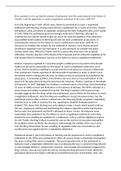How accurate is it to say that the actions of parliament were the main reason for the failure of
Charles I and his opponents to reach a negotiated settlement in the years 1640–49?
From the beginning of 1640, efforts were shown by parliament to reach a negotiated
settlement with the King. Having ruled without a parliament for 11 years of tyranny, Charles
still failed to show any desire to negotiate, dissolving the Short Parliament after just 3 weeks
in 1640. While the parliament grew increasingly intolerant of the King's attempts to
continue the war and his refusal to give up any of his royal prerogatives, this intolerance
was justified by the actions of the King who did not seek a settlement at any point. In
examining the reasons for the failure to reach a settlement in the years 1640-49, it is
necessary to consider the reasons for the outbreak of civil war, since Charles proved
unwilling to negotiate once war had begun. It is also necessary to consider the peace
treaties which were offered to Charles and the reasons why they were not accepted.
Ultimately, Charles rejection of the Heads of the Proposals and his refusal to negotiate at his
trial showed that his obstinance was key to the failure to reach a negotiated settlement.
Charles' refusal to negotiate in a way that sought a settlement at any point in this decade
makes him primarily responsible for the failure to reach a negotiated settlement, as he
proves that he would be unwilling to accept even the most generous of peace settlements
from parliament. Charles rejection of the Newcastle Propositions in 1646, in which it was
demanded that he relinquished 20 years of militia control to parliament and abolished the
episcopacy, is somewhat justified, since Charles was very clear on his prioritisation of the
powers of the episcopacy during the personal rule. However, Charles' rejection of the Heads
of Proposals, in 1647, highlights the stubborn, irrational nature of this King. Only demanding
10 years of militia control and limitations on the powers of bishops, the NMA's attempt at a
peace treaty was widely considered to be fair. The King's rejection of this peace treaty
strongly suggests that the King, rather than parliament, was to blame for the failure to reach
a negotiated settlement, since the King was unwilling to accept any peace treaty, but the
parliament tried to offer a chance. Furthermore, the King only finally accepted a negotiation
with the Scots in 1648 to continue the war, agreeing to establish Presbyterianism in
England. This shows that the King was only willing to make a treaty which would continue
the war, stopping at nothing and abandoning the religious objections which had inspired
him to reject the parliament and NMA's attempts at peace. Hence, the King was more
responsible than parliament for the failure to reach a negotiated settlement as the King
showed he was unwilling to negotiate for a settlement, only to continue fighting to impose
his will. Finally, the King's failure to plead his case at the trial for his execution exemplifies
his stubborn nature perfectly. By refusing to acknowledge the validity of the court at his
trial, the King showed that he was unwilling to negotiate under any circumstances and
sacrificed any last opportunity for a negotiated settlement.
Parliament played a role in the failure of the King and his opponents to reach a negotiated
settlement in the 1640s since parliament's offers of a peace treaty consistently overstepped
the mark, leaving little room to negotiate. The most important role of the parliament in
failing to reach a negotiated settlement was in continuing the war, in which the King refused
to acknowledge defeat or compromise. However, even though the parliament triggered the
King's actions, they do not justify his actions, leaving the King primarily at fault. While the
parliament did issue the highly contentious Grand Remonstrance of November 1641, this




